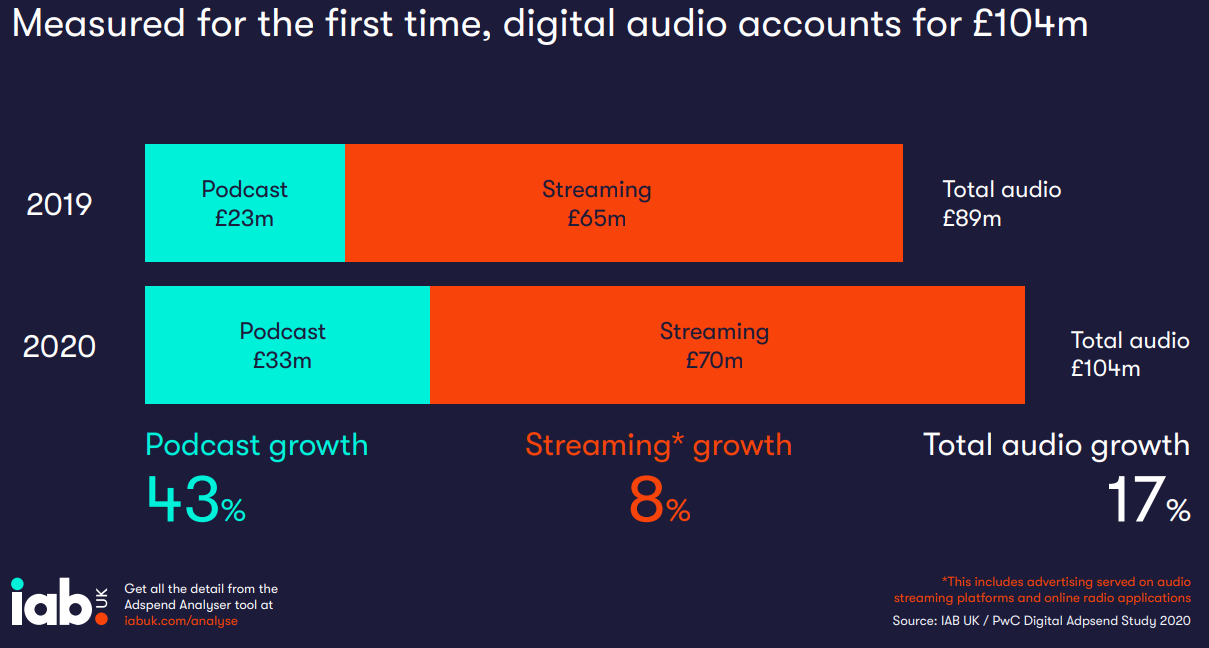Context is king: how podcast publishers Acast and Dax are targetting conversations

Conversational targetting tools are the natural next step in effective contextual marketing, according to leaders in the podcasting space.
Acast and Digital Ad Exchange (DAX) at Global announced at IAB’s Podcast Upfronts last week their conversational targetting products.
These tools use AI or machine learning to search podcast transcripts for keywords to filter the most relevant episodes and podcasts for a brand’s campaign.
In IAB’s How to harness contextual targeting report, it defines contextual targeting as “a form of advertising that chooses to serve an ad based on the content and environment that the ad will appear in, as opposed to data on the user that the ad is being served to”.
This moves away from audience targetting and reliance on third-party cookies. This is even more significant when considering that podcasts are “a cookieless environment” because of the nature of RSS technology where advertisers can still find a way to place ads in relevant spaces for their ideal target audience.
Contextual marketing is proven to improve engagement and recall, with one study from contextual intelligence platform GumGum discovering contextually relevant ads were 2.2x more memorable and had 43% higher neural engagement than contextually irrelevant ads.

Georgie Holt, MD of UK+ at Acast explained: “Podcasting absolutely has your undivided attention. You have to carve out the time in your day to listen to a podcast. It tends to be the connection of that sole focus you have which makes it so deep, and connected and trusted and creates that loyalty between the listener and the creator. So, we have to be even more respectful of that relationship.”
When a conversational targetting tool is applied to podcasting this is with an audience that is proven to already be positively inclined to ads as they recognise they contribute to the quality of the production of the content they choose to listen to.
Kantar Media Reactions 2021 highlighted podcasting as the number-one online channel for advertising equity which it defined as “places where users of media channels and media brands most appreciate advertising and are least likely to view ads negatively”.
It surveyed more than 14,500 consumers, covering 290 brands in 23 markets and reported: “Consumers have formed more opinions about podcasts as an ad platform; podcast ads are perceived as both better quality and more relevant, but also more repetitive compared to 2020.”
In terms of investment, Kantar’s study found marketers increased investment in podcasts in 2021 and would continue to invest more in 2022, which was echoed by research from DAX which revealed 55% of marketers surveyed had already invested into podcasts in the last year and 75% were planning to do so in the next 12 months.
For the first time, the IAB UK has produced spend figures for podcasts which revealed spend in 2020 was £33m and had grown 43% from 2019.
The space has become more competitive, too, with established publishers Acast and Audioboom facing competition from DAX, Podfront (a joint venture between Stitcher and Amazon Music’s Wondery) and Spotify.

‘The purest form of contextual targetting’
Josh Woodhouse, UK director of sales for Acast, told Mediatel News: “Conversational targeting allows a far more niche and intricate targeting than perhaps just that broader contextual vertical can offer.”

He added: “There’s nothing worse than a disingenuous endorsement and that feeling of butting into a conversation uninvited and getting the context completely wrong.
“Whereas conversational targetting is the purest form of contextual targetting which allows us to be welcomed into that conversation in the way that feels very natural.”
Acast is already using this tool with a “reputable train company” which searched the words “staycation” and “travel” to narrow down episodes that they wanted to advertise on.
A leading supermarket brand and a high-street bank will also be launching campaigns in October using conversational targetting to filter the most appropriate podcast content for their products.
Woodhouse highlighted that this tool is not only used to target podcasts that advertisers want to appear in, but also to avoid podcasts where the context is not suitable for their brand.
He clarified: “On the flip side, when we’re thinking about what we call brand suitability, it is really important as well to offer to utilise the exact same technology but to offer the complete opposite.
“So if for example you’re a motor brand that wants to avoid keywords like carbon emissions, what we can also do is we can look at targeting ad campaigns away from certain episodes that mentioned those kind of buzzwords for certain brands in particular.”
This brand suitability goes a step further than brand safety and Acast’s conversational tool is accessible in “a primary stage” online in their digital storefront.
Moving away from ‘blunt targetting’
Faye McDowall, strategy director for Digital Ad Exchange (DAX) at Global told Mediatel News that conversational targetting of its podcasts “broadens scale of advertisers’ exposure” while allowing them to move away from “blunt targetting” that feel intrusive to the listener and the creator.

She added that: “DAX’s new conversational targeting tool scans terms and phrases in a podcast, using machine learning to understand the frequency and relationships between terms to derive context, enabling brands to identify specific conversation topics in specific podcast episodes that will resonate with their audiences.”
Currys PCWorld is the first brand to use this technology with DAX with its Go Greener campaign created by agency partner Spark.
This campaign will raise awareness of its sustainable kitchen appliance range from greener washing machines to smart fridge freezers with podcast listeners and will run until 8 November.
McDowall said: “Using DAX’s new technology, Currys PC World will be able to target conversations about food and the home, ensuring placements heard in podcast conversations where real-life use cases of the products will resonate with listeners.”
Similar to Acast, conversational targetting can be used to exclude podcasts and episodes from your media plan, for example a travel brand can choose not to appear around a chat about airport delays.

Since DAX launched conversational targetting last month it has seen “keen interest” from many different categories including sport, food, consumer electronics, events and autos.
Tony McAllister, partnerships development director at DAX added: “It is a really good indicator when brands want to do something new. It’s when you know podcasts are established. It is a norm to do a host read campaign and have a sponsor for a podcast but now we can build the partnerships into something much bigger.”



